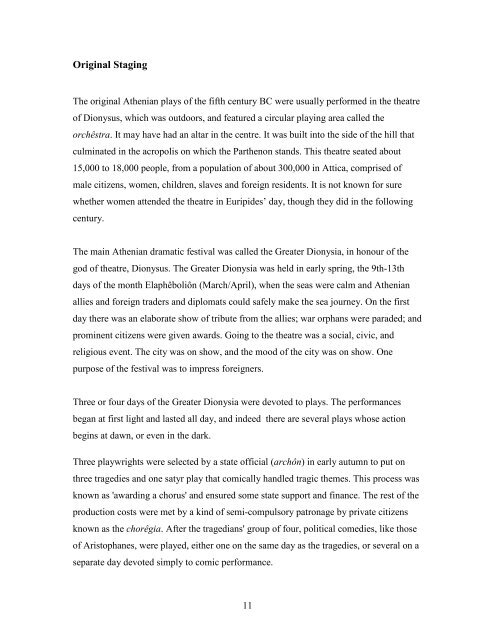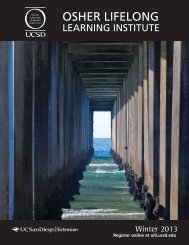1 EURIPIDES' TROJAN WOMEN PREFACE, TRANSLATION, and ...
1 EURIPIDES' TROJAN WOMEN PREFACE, TRANSLATION, and ...
1 EURIPIDES' TROJAN WOMEN PREFACE, TRANSLATION, and ...
Create successful ePaper yourself
Turn your PDF publications into a flip-book with our unique Google optimized e-Paper software.
Original Staging<br />
The original Athenian plays of the fifth century BC were usually performed in the theatre<br />
of Dionysus, which was outdoors, <strong>and</strong> featured a circular playing area called the<br />
orchêstra. It may have had an altar in the centre. It was built into the side of the hill that<br />
culminated in the acropolis on which the Parthenon st<strong>and</strong>s. This theatre seated about<br />
15,000 to 18,000 people, from a population of about 300,000 in Attica, comprised of<br />
male citizens, women, children, slaves <strong>and</strong> foreign residents. It is not known for sure<br />
whether women attended the theatre in Euripides’ day, though they did in the following<br />
century.<br />
The main Athenian dramatic festival was called the Greater Dionysia, in honour of the<br />
god of theatre, Dionysus. The Greater Dionysia was held in early spring, the 9th-13th<br />
days of the month Elaphêboliôn (March/April), when the seas were calm <strong>and</strong> Athenian<br />
allies <strong>and</strong> foreign traders <strong>and</strong> diplomats could safely make the sea journey. On the first<br />
day there was an elaborate show of tribute from the allies; war orphans were paraded; <strong>and</strong><br />
prominent citizens were given awards. Going to the theatre was a social, civic, <strong>and</strong><br />
religious event. The city was on show, <strong>and</strong> the mood of the city was on show. One<br />
purpose of the festival was to impress foreigners.<br />
Three or four days of the Greater Dionysia were devoted to plays. The performances<br />
began at first light <strong>and</strong> lasted all day, <strong>and</strong> indeed there are several plays whose action<br />
begins at dawn, or even in the dark.<br />
Three playwrights were selected by a state official (archôn) in early autumn to put on<br />
three tragedies <strong>and</strong> one satyr play that comically h<strong>and</strong>led tragic themes. This process was<br />
known as 'awarding a chorus' <strong>and</strong> ensured some state support <strong>and</strong> finance. The rest of the<br />
production costs were met by a kind of semi-compulsory patronage by private citizens<br />
known as the chorêgia. After the tragedians' group of four, political comedies, like those<br />
of Aristophanes, were played, either one on the same day as the tragedies, or several on a<br />
separate day devoted simply to comic performance.<br />
11









